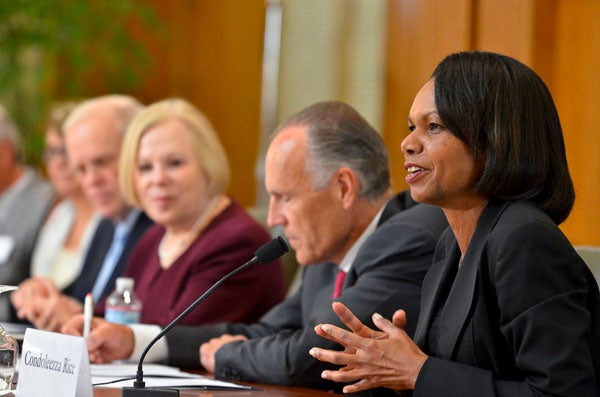|
September 11, 2012
Stanford gathering explores why national security needs the humanities
Military leaders, Stanford scholars and government officials contribute to a congressional report on how the humanities factor into international relations and national security. By Corrie Goldman

Humanities education fosters creative thinking and teaches the 'undervalued' skill of persuasive writing, former U.S. secretary of state and current Stanford professor Condoleezza Rice said at the forum. Seated next to Rice is Steven Denning, the chair of Stanford's Board of Trustees. (Photo: Rod Searcey / Courtesy of Stanford University)
Leading experts in foreign policy, national defense, international diplomacy and foreign language study came together at Stanford recently to discuss an unlikely common career thread: the humanities and social sciences.
Those in attendance included former U.S. secretary of state and current Stanford professor Condoleezza Rice; former secretary of defense and Stanford professor emeritus William Perry; venture capitalist Steven Denning, the chair of the Stanford Board of Trustees; Karl Eikenberry, a fellow at Stanford's Center for International Security and Cooperation, former ambassador to Afghanistan and a retired general. They were among the 26 attendees who talked about how the humanities and social sciences strengthen America's diplomatic, defense and international policy endeavors.
They were called together by a national commission that has been charged by Congress with finding ways for the United States to maintain national excellence in the humanities and social sciences.
Eikenberry succinctly captured the importance of the conversation when he said that knowledge of history, foreign languages and cultures can help America more successfully navigate the increasing number of "multinational issues that need multinational solutions."
Stanford Professor of German studies and comparative literature Russell Berman echoed Eikenberry's sentiments about the value of foreign language skills and urged the commission to look at America's K-12 foreign language requirements, which are much less stringent than those of the European Union countries.
In stressing the importance of the human element on the front lines, Joel Vowell, a lieutenant colonel in the U.S. Army who has served in Iraq and Afghanistan, said that by placing a well on the Afghan border his soldiers inadvertently chose sides in a 400-year-old dispute between two villages. Vowell added that when soldiers are preparing for complex warfare scenarios, most of their questions are about culture and history.
William Treseder, a sergeant in the Marines, graduated from Stanford last winter with a science, technology and society degree. Treseder, who has served in Iraq and Afghanistan, said that the best officers are those who have a background in language or history because they can view a situation from someone else's perspective and have the "ability to operate in an ambiguous environment."
Stanford Professor of political science Scott Sagan noted how literature and poetry powerfully convey concepts like mercy and justice. Sagan, a senior fellow at the Freeman Spogli Institute, said students in his sophomore political science course are required to read the classical work of Thucydides because, "There's no better way to understand human behavior in war."
Created by the American Academy of Arts & Sciences, the Commission on the Humanities and Social Sciences is gathering information on best practices, innovations and ideas to strengthen and promote the humanities and social sciences in the United States.
Stanford University President John L. Hennessy, who is also a commission member, moderated the hearing, which is one of a number of similar sessions being held throughout the country this year.
In opening remarks, Hennessy listed a number of distinguished Stanford alumni who were humanities majors and noted that a deep understanding of the humanities and sciences prepares students "not just for their first job, but for a career of accomplishment."
The forum, entitled The Humanities & Social Sciences for International Relations, National Security and Global Competitiveness, explored the crucial role that the humanities and social science disciplines play in helping America maintain a competitive edge in a global economy.
In explaining to her business and economics students why they need to study the humanities and social sciences, Rice said she emphasizes how those disciplines create students who are "rigorous problem-solvers in terms of understanding behavior," which she said is especially pertinent in the technology realm.
Rice also noted how a humanities education fosters creative thinking and teaches the "undervalued" skill of persuasive writing. A well-written two-page essay to the secretary of state or the president, she said, "can make the difference in decision-making."
Eikenberry, who shared his experiences learning Chinese and then visiting China as a young West Point cadet, said economic changes are making the nation "more dependent on collective approaches." This shift, he said, means that the United States needs a "a cadre of Americans in our government, military, business, civil society, academe, arts and beyond who have the right skills and the right experiences to help America stay connected to the world and shape outcomes and further our interests."
-30-
|